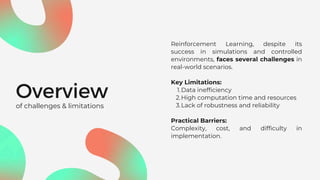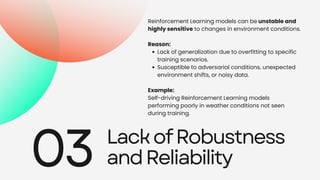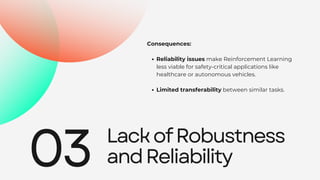Limitations of Reinforcement Learning - ML
Reinforcement Learning (RL) is a machine learning technique where an agent interacts with an environment, learning through trial and error to maximize cumulative rewards. While RL has achieved significant success in simulations and controlled settings, real-world applications remain challenging due to several limitations. One key issue is data inefficiency, as RL algorithms require vast amounts of data to learn effectively. This dependency often makes real-world data collection expensive and impractical, forcing reliance on simulated environments that may not accurately reflect real-world conditions. Additionally, high computational costs and resource intensiveness make RL difficult to implement at scale. Training sophisticated models like AlphaGo demands thousands of GPUs running for extended periods, making RL solutions impractical for many organizations. Another significant limitation is the lack of robustness and reliability in RL models, which struggle to generalize beyond their training scenarios. Small environmental changes, adversarial conditions, or unexpected shifts in input data can degrade performance, making RL less viable for safety-critical applications such as autonomous vehicles and healthcare. Practical barriers like complex model design, expensive real-world testing, and challenges in defining appropriate reward functions further hinder RL adoption. Ethical concerns also arise, as poorly tuned RL systems may behave unpredictably. In industries like finance, robotics, and healthcare, RL models often face reliability issues due to data scarcity, unpredictability, and high implementation costs. To make RL more practical, future research should focus on improving sample efficiency, reducing computational demands, and enhancing model robustness, ultimately bridging the gap between theoretical success and real-world applicability.


















Recommended




























































More Related Content
Similar to Limitations of Reinforcement Learning - ML (20)








































Recently uploaded (20)


















![PLAN_OF_WORK_PPT_BY_ROHIT_BHAIRAM_--2212020201003[1] new.pptx](https://cdn.slidesharecdn.com/ss_thumbnails/planofworkpptbyrohitbhairam-22120202010031new-250329072214-99e4fccd-thumbnail.jpg?width=560&fit=bounds)
![PLAN_OF_WORK_PPT_BY_ROHIT_BHAIRAM_--2212020201003[1] new.pptx](https://cdn.slidesharecdn.com/ss_thumbnails/planofworkpptbyrohitbhairam-22120202010031new-250329072214-99e4fccd-thumbnail.jpg?width=560&fit=bounds)






Limitations of Reinforcement Learning - ML
- 1. Limitations of Reinforcement Learning Challenges and Barriers to Real-World Implementation Presented by Jia Bindra
- 2. 3 Introduction 4 Key Concepts 5 Overview 6 Limitations CONTENT Practical Barriers to Implementation Real World Scenarios Conclusion
- 3. Introduction ReinforcementLearning Reinforcement Learning (RL) is a type of machine learning where an agent learns how to make decisions by interacting with an environment. The agent takes actions, receives feedback in the form of rewards or penalties, and adjusts its strategy to maximize cumulative rewards over time.
- 4. What isanAgent? An agent in Reinforcement Learning (RL) is the core component of the RL system that interacts with the environment to learn optimal behavior. The agent is the decision-maker in the RL framework, responsible for taking actions, receiving feedback, and adjusting its strategy to achieve a specific goal.
- 5. Key Concepts Agent and Environment Interaction: The agent explores the environment, learns from outcomes, and refines its actions. Trial and Error Learning: RL relies on continuous experimentation, using feedback to improve decisions. Applications: RL is widely used in robotics, game AI (like AlphaGo), autonomous vehicles, and more.
- 6. Overview Reinforcement Learning, despite its success in simulations and controlled environments, faces several challenges in real-world scenarios. Key Limitations: Data inefficiency 1. High computation time and resources 2. Lack of robustness and reliability 3. Practical Barriers: Complexity, cost, and difficulty in implementation. of challenges & limitations
- 7. Limitations
- 8. Data Inefficiency Reinforcement Learning algorithms often require a large amount of data to learn effectively, especially in complex environments. Reason: Learning through trial and error involves exploring vast action spaces. Example: Training a Reinforcement Learning model to play chess requires millions of game simulations. 01
- 9. Data Inefficiency Consequences: In real-world tasks, data collection can be expensive or time-consuming. High dependency on simulated environments which may not perfectly replicate reality. 01
- 10. 02 ComputationTimeand ResourceIntensiveness Reinforcement Learning models are computationally expensive, requiring significant processing power and time. Reason: Complex algorithms like deep Q-networks (DQN) involve deep neural networks that need extensive tuning. High dimensional action spaces slow down convergence. Example: Training AlphaGo involved thousands of GPUs running for weeks.
- 11. 02 ComputationTimeand ResourceIntensiveness Consequences: Not feasible for many organizations due to high computational costs. Limits the scalability of Reinforcement Learning solutions.
- 12. 03 LackofRobustness andReliability Reinforcement Learning models can be unstable and highly sensitive to changes in environment conditions. Reason: Lack of generalization due to overfitting to specific training scenarios. Susceptible to adversarial conditions, unexpected environment shifts, or noisy data. Example: Self-driving Reinforcement Learning models performing poorly in weather conditions not seen during training.
- 13. 03 LackofRobustness andReliability Consequences: Reliability issues make Reinforcement Learning less viable for safety-critical applications like healthcare or autonomous vehicles. Limited transferability between similar tasks.
- 14. Designing RL algorithms requires deep expertise, extensive tuning, and trial and error. Complex Model Design & Tuning Testing in the real world (e.g., robotics) is costly and can lead to physical damage. High Cost of Real World Experiments Defining rewards in complex tasks can be challenging, leading to unintended behaviors. Difficulty in Reward Shaping RL systems, when improperly tuned, can act unpredictably, raising safety and ethical issues. Ethical and Safety Concerns Practical Barriers to Implementation
- 16. Data scarcity, safety concerns, and ethical constraints prevent reinforcement learning from being widely used. Healthcare Scenarios High volatility and unpredictable market behaviors can cause RL models to make unreliable decisions. Finance Physical risks during the learning phase, along with high costs, limit RL use in robotics. Robotics
- 17. Conclusion RL holds immense potential but is limited by data inefficiency, computational demands, lack of robustness, and practical barriers. Future research should focus on improving sample efficiency, enhancing generalizability, and reducing computational costs. Balancing the trade-offs between performance and practical implementation is key for RL's real-world success.
- 18. Thank You








